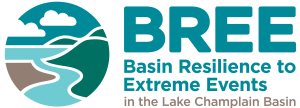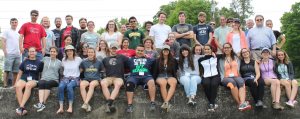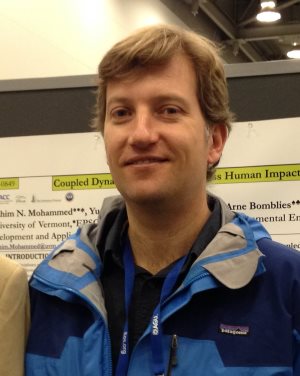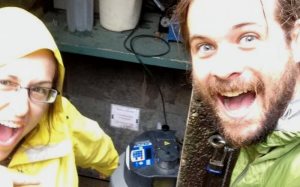News
VT EPSCoR CWDD Macroinvertebrate Workshop

On July 14, 2016 Professor Declan McCabe from Saint Michael's College and CWDD Research Technician Janel Roberge welcomed four middle/high school teachers to the Saint Mike's Campus for an annual Macroinvertebrate Identification Workshop. As part of the Middle School Outreach Program, these teachers got to learn more about the history of macroinvertebrates in Vermont in addition to practicing their macroinvertebrate identification skills. Of course, they won't soon forget the live giant hellgrammite that Declan caught in a nearby stream before the workshop! In attendance were: Jane Walczykowski from Craftsbury Academy, Pamela Burke from Marlboro School, David Jensen from Camel's Hump Middle School, and Josepha Austin from Burlington High School.
Categories: Latest News
RACC Member Beverley Wemple Receives Fulbright U.S. Scholar Grant

Dr. Beverley Wemple, Associate Professor, Department of Geography at the University of Vermont was awarded a Fulbright U.S. Scholar grant for 2016-17. Dr. Wemple will be continuing a project that she started in 2013 (Mazar River Project) and studying geomorphology of mountain rivers on the eastern cordillera of the Andes in Ecuador to construct the first hydraulic geometry for rivers of this region.
The overarching goals of Dr. Wemple's Fulbright proposal are to develop baseline data on Ecuadorian rivers as a basis for tracking future environmental change and to contribute to capacity building among Ecuadorian students and local stakeholders. The Fulbright grant will also enable Dr. Wemple to construct the first hydraulic geometry for rivers of that region by studying the geomorphology of mountain rivers on the eastern cordillera of the Andes in Ecuador.
The Mazar River Project generates information about stream flow and sediment to inform watershed management in the high-mountain areas of southern Ecuador. The Project is a collaboration between the Fundación Cordillera Tropical, the University of Vermont, and public hydroelectric companies in Ecuador. It includes three major initiatives:
* Scientific research on stream flow and sediment transport.
* Capacity building for Ecuadorian University students and professionals.
* Interventions to reduce erosion of sediment off nearby landscapes.
The Fulbright Program aims to increase mutual understanding between the people of the United States and the people of other countries, and it is the flagship international educational exchange program sponsored by the U.S. government. As a Fulbright grantee, Dr. Wemple will join the ranks of distinguished participants in the Program. Since its beginnings in 1946, more than 360,000 Fulbrighters have participated in the Program.
Categories: Latest News
RACC member Alan Betts is the first recipient of the Bert Bolin award from the American Geophysical Union

Alan Betts is the first recipient of the Bert Bolin award from the American Geophysical Union Global Environmental Change focus group. The award recognizes his work in Vermont as well as his RACC/BREE related research.
Bert Bolin was an outstanding researcher and an effective scientific statesmen and international leader who directly contributed to a broad understanding of the social, political and security consequences of climate change brought by human impacts. The Bert Bolin Award/lecture is designed in recognition of an earth scientist for his/her ground breaking research or/and leadership in global environmental change through cross-disciplinary, interdisciplinary, and trans-disciplinary research in the past 10 years. The award consists of a certificate, a 40-50 minutes GEC named lecture, and dinner at the GEC dinner event during the Fall AGU Conference, where the award will be presented.
Dr. Rong Fu, President, Global Environmental Change Focus Group, and Chair, AGU Environmental Change Focus Group Award Committee, said that Dr. Betts' research "has been transformative by providing a new understanding of one of the fundamental climate processes - land-atmospheric coupling and how it varies across time scales from the diurnal scale, with land cover, and how it may vary under environmental change. His environmental change leadership in Vermont, and writings dealing with weather, climate, climate change, energy and policy issues have fostered positive debate and have encouraged the reader to explore alternative and hopeful paths for themselves, their families and society faced with the broader issues of climate and climate change".
Categories: Latest News
Dr. Arne Bomblies appointed Senior Associate Project Director for VT EPSCoR

VT EPSCoR and the VT Technology Council are very pleased to announce that Dr. Arne Bomblies has been appointed Senior Associate Project Director for VT EPSCoR at the University of Vermont.
Dr. Bomblies has an outstanding career of research, teaching and leadership. He joined the University of Vermont in 2009 and is currently Associate Professor in the School of Engineering. His research foci are broadly centered on the impacts of climate change and variability. Within this context, there are two specific focus areas of Dr. Bomblies' research: disease/climate connections and regional adaptation to climate change.
Within VT EPSCoR he has served as a leader for the Watershed Processes Group since 2011 and was instrumental in the development of the new five-year award from the National Science Foundation (NSF) focused on Lake Champlain Basin Resilience to Extreme Events (BREE). Dr. Bomblies has traveled to the National Science Foundation to report directly on progress for the Adaptation to Climate Change in the Lake Champlain Basin: New Understanding through Complex Systems (RACC) award; he has also presented many RACC related posters and talks at national venues and co-authored several publications.
Dr. Judith Van Houten, VT State EPSCoR Director, is delighted to welcome Dr. Bomblies in his new position. "We have benefitted greatly from Dr. Bomblies' insights and collaborative leadership contributions within our research and modeling efforts. Now we have even more benefit as he expands his role."
Please join in welcoming Arne Bomblies as the Senior Associate Project Director of VT EPSCoR.
Categories: Latest News
Job openings at Vermont EPSCoR

Vermont EPSCoR is currently hiring a Coordinator for the VT EPSCoR Center for Workforce Development and Diversity. We are also seeking applicants for a Program Specialist.
In addition to the above two positions, Vermont EPSCoR is recruiting several PhD level graduate students and postdoctoral associates to join our cutting-edge NSF funded research on Basin Resilience to Extreme Events (BREE). We are initiating a five-year award of large-scale interdisciplinary studies which will determine how the Lake Champlain Basin's landscape, watershed and lake conditions respond to extreme weather events and will test policy scenarios for enhancing resilience using our comprehensive Integrated Assessment Model (IAM). As a member of the BREE team, you will have excellent mentoring and participate in unique learning and professional development experiences including learning to communicate your science through our program with the Alan Alda Center for Communicating Science.
Categories: Latest News
A first-of-its-kind event between the Chattanooga TN Library and the Burlington VT Fletcher Free Library enabled by VT EPSCOR

A first-of-its-kind event between the Chattanooga TN Public Library and the Burlington VT Fletcher Free Library enabled by VT EPSCoR! The technology used in this event (LOLA) only works over Internet2, and thus, this event was only possible because of our VT UCAN efforts.
After a series of tests, Chattanooga, TN Library and partners in Burlington, Vermont at the Fletcher Free Library decided to try to pull off an ambitious public event on Tuesday, June 21, as part of the International Make Music Day celebration of live music for cities across the globe. Make Music is held in more than 700 cities in 120 countries.
Categories: Latest News
Earth ignores politics - Rutland Herald
Rutland Herald
There has been a lot of flooding across the planet this spring, perhaps because storm systems are traveling across the landscape less quickly and raining in the same place for longer. The day-to-day patterns of weather are so complicated that it is ...
and more »
Categories: Latest News
Net gain: Virtual workshops help statewide - Rutland Herald
Rutland Herald
“David and others took a look and said, now that UVM faculty can do the work they need to do, how can we share this great networking capability with the rest of the Vermont,” says Patrick Clemins, cyber specialist at Vermont EPSCoR, a UVM-led research ...
and more »
Categories: Latest News
NSF announces 2016 EPSCoR Research Infrastructure Improvement Track-1 awards
University of Vermont (Judith Van Houten, Principal Investigator)
The Lake Champlain Basin is an enormous economic and ecological asset to Vermont, but the lake and surrounding area are increasingly under threat from extreme weather events. Adaptive strategies are needed to increase resiliency of the combined social-ecological system and protect lake and drinking-water quality. This project will support collaborative, team-based research in ecology, hydrology, social science and modeling. The project will advance the field of coupled social-environmental system research and the development of Integrated Assessment Models to enable managers and policy makers to assess a range of adaptive management strategies. Hands-on activities will engage and interest middle-and high-school students in STEM and lead to advanced training for a new generation of STEM researchers. Six Vermont universities and colleges will participate, led by the University of Vermont, with Castleton University, Lyndon State College, Johnson State College, Middlebury College, and Saint Michael's College.
The Lake Champlain Basin is an enormous economic and ecological asset to Vermont, but the lake and surrounding area are increasingly under threat from extreme weather events. Adaptive strategies are needed to increase resiliency of the combined social-ecological system and protect lake and drinking-water quality. This project will support collaborative, team-based research in ecology, hydrology, social science and modeling. The project will advance the field of coupled social-environmental system research and the development of Integrated Assessment Models to enable managers and policy makers to assess a range of adaptive management strategies. Hands-on activities will engage and interest middle-and high-school students in STEM and lead to advanced training for a new generation of STEM researchers. Six Vermont universities and colleges will participate, led by the University of Vermont, with Castleton University, Lyndon State College, Johnson State College, Middlebury College, and Saint Michael's College.
Categories: Latest News
Pinder Receives Lifetime Achievement Award from Leading Professional Association - UVM News
UVM News
George Pinder holds a model that he uses in teaching numerical methods for engineers. He notes that while he could use a drawing instead, the three-dimensional object is more flexible and appealing to students who are learning how to represent physical ...
Categories: Latest News
Watershed Moments - Dr. Yu-shiou Tsai and Graduate Research Assistant, Kristen Underwood
Presented here is the third of three 2016 Watershed Moments Scholarly Conversations Videos.
"Watershed Moments", features brief, informal discussions between faculty, graduate students and post doctoral associates, sharing and learning about a recent accomplishment in the member's field of expertise with a colleague or student from outside their field of expertise.
This video features a discussion on:
"An interactive land use transition agent-based model: Endogenizing human-environment interactions in the Western Missisquoi Watershed." with Dr. Yu-shiou Tsai, Post-Doc Research Associate, VT EPSCoR and Kristen Underwood, Graduate Research Assistant, VT EPSCoR.
"Watershed Moments", features brief, informal discussions between faculty, graduate students and post doctoral associates, sharing and learning about a recent accomplishment in the member's field of expertise with a colleague or student from outside their field of expertise.
This video features a discussion on:
"An interactive land use transition agent-based model: Endogenizing human-environment interactions in the Western Missisquoi Watershed." with Dr. Yu-shiou Tsai, Post-Doc Research Associate, VT EPSCoR and Kristen Underwood, Graduate Research Assistant, VT EPSCoR.
Categories: Latest News
2016 RACC Undergraduate Intern Orientation - May 23-27, 2016

On Sunday, May 22nd, thirty-three undergraduate students started their Summer Internships. Beginning with a comprehensive orientation, students learned about the VT EPSCoR Adaptation to Climate Change Research in the Lake Champlain Basin (RACC) program, and participated in several teambuilding exercises. Interns were introduced to their specific RACC research question, and through conversations with their mentors, gained understanding of how their research would tie into the bigger picture.
Dr. Christopher Koliba provided an introduction to the goals and products of RACC over the last five years. Following the presentation, roundtable discussions were held. These discussions allowed interns to learn not only about their own RACC Questions, but to learn what other interns would be researching over the summer as well, and how all of the questions are linked. A quick transition after lunch brought interns to the UVM ropes course at Farrell Park. At the ropes course, interns learned the value of teamwork, and discovered that a variety of skills is required to be successful during the internship.
Interns were able to see both projects funded through the NSF EPSCoR Track-1 and Track-2 NEWRnet (NorthEast Water Resources Network) and RACC technology during a "forest-farm-lake" field trip of the Missisquoi River basin. This watershed tour was led by Drs. Andrew Schroth, Steve Scheinert and Declan McCabe. While visiting various tributaries of the Missisquoi River, as well as the river itself, interns were able to see, first hand, the effects of phosphorus on the river, and how the effects vary from a forested stream; to a stream in close proximity to a farm. Interns also learned about some of the policies in place to help control the potentially negative effects of some farming practices on rivers, and how effective best practices can work hand in hand with policy makers. The field trip culminated with a visit to the Missisquoi Bay, where algal blooms frequently grow in late summer.
A Climate Change Workshop led by Drs. Carol Adair and Alan Betts followed the next day. The lectures addressed climate change, assumptions around the terminology, as well as data showing current trends. Students engaged in a lively discussion. After lunch, interns enjoyed a hike at Lone Rock Point in Burlington, VT. There, they were able to observe Lake Champlain, New York's Adirondack Mountains, and the Champlain Thrust Fault, a portion of the Point in which older rock had been thrust on top of newer rock.
The final day of orientation began with a library lecture at UVM to help interns learn where to find resources for their summer research. After the long Memorial Day weekend, interns jumped right into the internships, kicking off with their first workshop of the summer.
Categories: Latest News
2015 RACC Intern Nicolas Gomez Andujar to present RACC Research at Ecological Society of America Conference

2015 RACC Intern Nicolas Gomez Andujar has received a travel award to attend the Ecological Society of America conference in Florida! Nicolas will be presenting his RACC research at the conference which will be held on August 6th -12th, 2016. His internship was with RACC member Dr. Yu-shiou Tsai. He worked on evaluating an Interactive Land Use Transition Agent-based Model on the Missisquoi River watershed.
Categories: Latest News
RACC member Alan Betts: Reinventing Hydrometeorology using Cloud and Climate Observations

RACC member Alan Betts reciently gave a talk entitled "Reinventing Hydrometeorology using Cloud and Climate Observations" at a symposium at Princeton in honor of Eric Wood who has been a professor there for 40 years. The talk covered Dr. Betts' research on snow as a climate switch, the long memory in spring of precipitation back through winter, and the impact of cloud and precipitation memory on summer climate.
Categories: Latest News
RACC Leader Arne Bomblies to give presentation at the NOAA in Vermont Roundtable

RACC Leader Arne Bombles will present on the role of NOAA data in RACC and BREE at the NOAA in Vermont Roundtable on June 23rd, 2016.
In 2014, NOAA began a series of thematic, state-based roundtables with Congressional district staff to broaden awareness of the lesser known and sometimes lesser seen aspects of our mission in Vermont. The briefings have been well-received due to their local focus and relevance to all participants. Each topic is demonstrated using a model which pairs a NOAA subject matter expert with an end user or partner to demonstrate the utility of that science, product or service to that state. The roundtables - held so far in Maine, Rhode Island, Connecticut, Delaware, New Jersey and Virginia - have been successful at bringing attention to key state and local partnerships, and even broadening awareness within NOAA of important collaborations.
The Vermont roundtable will be held at the ECHO Center from 10:00am to 3:00pm Thursday, June 23. It will highlight NOAA expertise and collaboration in building community resilience in Vermont and include discussion of precipitation trends, flooding, harmful algae bloom forecasting, climate services, reference datums, green infrastructure and floodplain management. Breck Bowden, Lake Champlain Sea Grant Director, will be the host.
Categories: Latest News
Watershed Moments - Dr. Peter Isles and Graduate Research Assistant, Linyuan Shang
Presented here is the second of three 2016 Watershed Moments Scholarly Conversations Videos.
"Watershed Moments", features brief, informal discussions between faculty, graduate students and post doctoral associates, sharing and learning about a recent accomplishment in the member's field of expertise with a colleague or student from outside their field of expertise.
This video features a discussion on:
"Dynamic internal drivers of a historically severe cyanobacteria bloom in Lake Champlain revealed through comprehensive monitoring" with Peter Isles, PhD candidate (now graduated class of 2016), VT EPSCoR and Linyuan Shang, Graduate Research Assistant, VT EPSCoR.
"Watershed Moments", features brief, informal discussions between faculty, graduate students and post doctoral associates, sharing and learning about a recent accomplishment in the member's field of expertise with a colleague or student from outside their field of expertise.
This video features a discussion on:
"Dynamic internal drivers of a historically severe cyanobacteria bloom in Lake Champlain revealed through comprehensive monitoring" with Peter Isles, PhD candidate (now graduated class of 2016), VT EPSCoR and Linyuan Shang, Graduate Research Assistant, VT EPSCoR.
Categories: Latest News
Watershed Moments - Dr. Ibrahim Mohammed and Graduate Research Assistant, Ryan Sleeper
Presented here is the first of three 2016 Watershed Moments Scholarly Conversations Videos.
"Watershed Moments", features brief, informal discussions between faculty, graduate students and post doctoral associates, sharing and learning about a recent accomplishment in the member's field of expertise with a colleague or student from outside their field of expertise.
This video features a discussion on:
"The use of CMIP5 data to simulate climate change impacts on flow regime within the Lake Champlain Basin" with Dr. Ibrahim Mohammed, Post-Doctoral Research Associate, VT EPSCoR and Ryan Sleeper, Graduate Research Assistant, VT EPSCoR.
"Watershed Moments", features brief, informal discussions between faculty, graduate students and post doctoral associates, sharing and learning about a recent accomplishment in the member's field of expertise with a colleague or student from outside their field of expertise.
This video features a discussion on:
"The use of CMIP5 data to simulate climate change impacts on flow regime within the Lake Champlain Basin" with Dr. Ibrahim Mohammed, Post-Doctoral Research Associate, VT EPSCoR and Ryan Sleeper, Graduate Research Assistant, VT EPSCoR.
Categories: Latest News
Castleton to invest $3.6 million in STEM facilities - Vermont Biz
Vermont Biz
Vermont Biz
Over the last six years the department has won more than $750,000 in grant funding from agencies such as the NSF, the Vermont Genetics Network (VGN), VT-EPSCoR, the USGS, and NEWRnet for active research. The majority of these funds have gone to ...
Categories: Latest News
Vermont EPSCoR Outreach Team Member Rachel Seigel - Rubenstein School Student Takes Playing in the Sandbox to New Heights
This summer, Seigel will collaborate with Dr. Donna Rizzo of the UVM College of Engineering and Mathematical Sciences, her graduate students, and two local high school students to make improvements to the Automated Reality Sandbox.
"When Rachel contacted me, her excitement was infectious and very indicative of why these systems are so popular with science museums and public outreach events," said Rizzo, who herself was mesmerized by her first experience playing in an AR Sandbox. "I've always wanted to find a way to use the ARS system to help explain some of the Vermont EPSCoR research on adaptation to climate change (RACC) we're doing in the Lake Champlain Basin. I'm hoping this summer that Rachel, in tandem with a few of my graduate students and some of the new EPSCoR undergraduate interns, might develop an educational module to help spread the fun and excitement of this research in a more hand-ons way."
"When Rachel contacted me, her excitement was infectious and very indicative of why these systems are so popular with science museums and public outreach events," said Rizzo, who herself was mesmerized by her first experience playing in an AR Sandbox. "I've always wanted to find a way to use the ARS system to help explain some of the Vermont EPSCoR research on adaptation to climate change (RACC) we're doing in the Lake Champlain Basin. I'm hoping this summer that Rachel, in tandem with a few of my graduate students and some of the new EPSCoR undergraduate interns, might develop an educational module to help spread the fun and excitement of this research in a more hand-ons way."
Categories: Latest News
ISCO Installations for the 2016 Field Season

It's officially field season! On May 12 and 13, VT EPSCoR Research Technicians, Saul Blocher and Janel Roberge, installed seven ISCO automated water samplers along the Winooski and Missisquoi Rivers. RACC ISCOs collect water samples before, during, and after storm events from May through November. Samples are analyzed in water quality labs on Saint Michael's College and Johnson State College campuses for TSS and various nutrient analytes.
Categories: Latest News